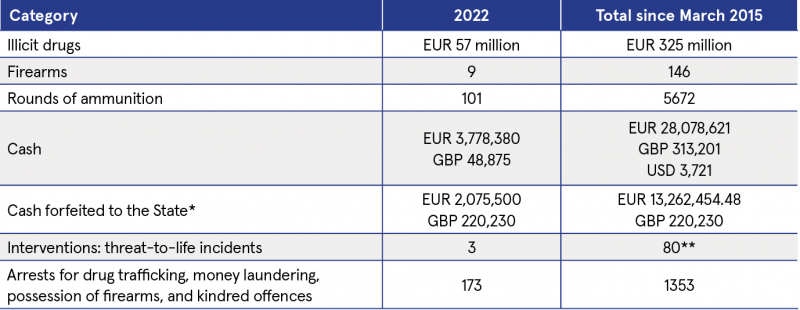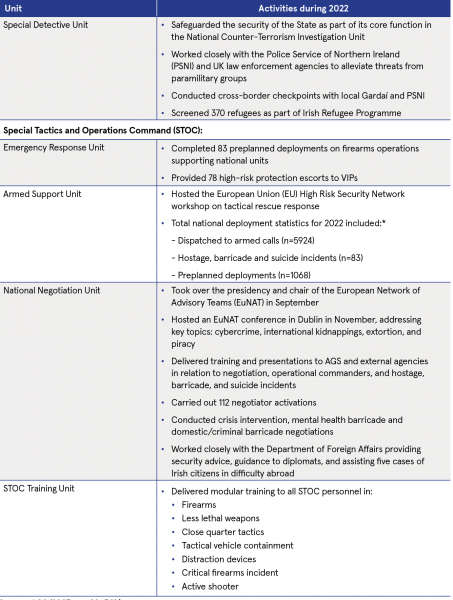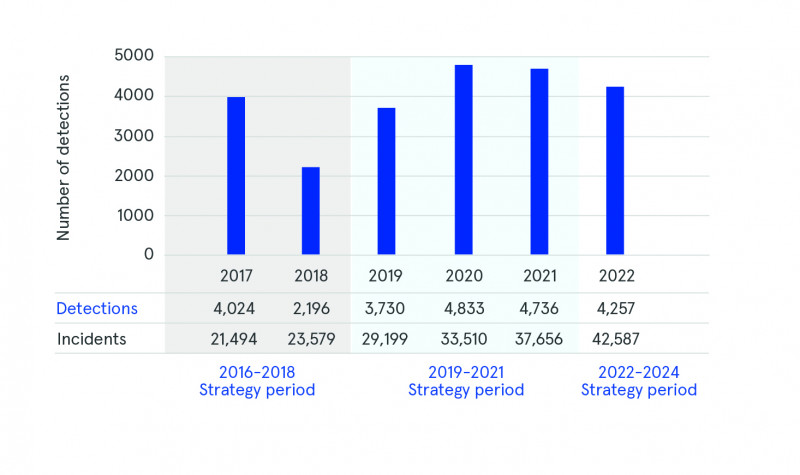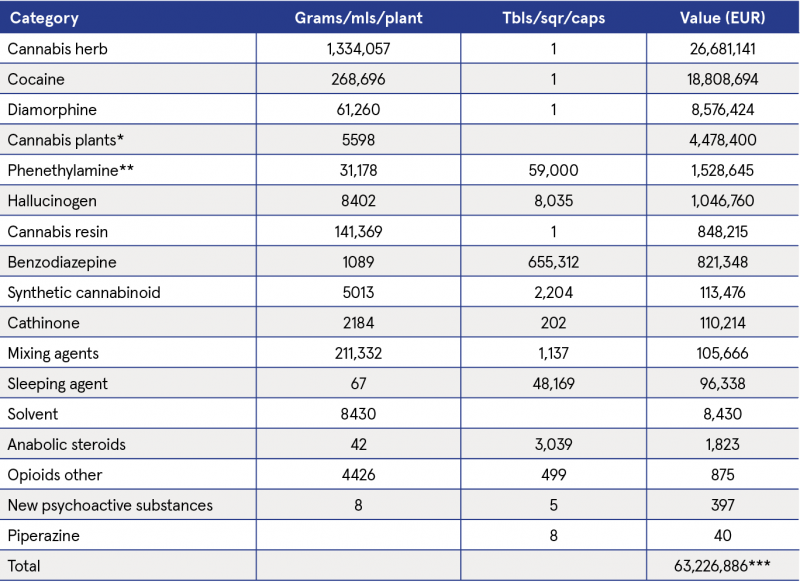Guiney, Ciara (2024) An Garda Síochána annual report, 2022. Drugnet Ireland, Issue 87, Winter 2024, pp. 37-45.
| Preview | Title | Contact |
|---|---|---|
|
PDF (Drugnet Ireland 87)
2MB |
In October 2023, An Garda Síochána (AGS) published its annual report for 2022.1 This article first reports on activities related to national policing, followed by national security and intelligence, community safety, and finally statistics for detections of incidents related to the sale and supply of drugs and Garda drug seizures for 2022.
National policing
Gardaí work in various units to fight crime across Ireland. What follows is a brief outline of a selection of the work undertaken by some of these units.
Garda National Drugs and Organised Crime Bureau
Table 1 provides a breakdown of seizures relating to operations carried out by the Garda National Drugs and Organised Crime Bureau (GNDOCB) in 2022.
Table 1: Summary of seizures by GNDOCB, March 2015–December 2022

Source: AGS (2023, p. 14)1
* This is the amount of cash forfeited to the State after relevant Court proceedings.
** 80 threat-to-life operations since 5 February 2016.
Note: These statistics relate to operations involving the GNDOCB and do not include seizures made by local Garda units.
Operation Thor
Operation Thor, AGS’s national anti-burglary operation, commenced in November 2015. Since then, there have been 18,189 arrests and 534,076 checkpoints. Burglary incidents in residential and non-residential settings have decreased by 48% and 44%, respectively.
Garda National Protective Services Bureau
The Garda National Protective Services Bureau (GNPSB) targets suspects involved in sexual crime, online child exploitation, child protection, domestic abuse, and human trafficking:
- The dedicated Child Sexual Abuse Reporting phoneline provided by AGS received 221 calls in 2022.1
- In 2022, some 42 victims (15 females and 27 males) of human trafficking were identified by AGS.
- In 2022, the Missing Persons Unit (MPU) recorded 10,510 missing person incidents, with 4,268 persons reported missing one or more times. At the end of 2022, there were 58 missing persons. The MPU also supported the United Kingdom’s (UK’s) National Crime Agency and police on a historical missing person case since 1982.
- Coercive control legislation has resulted in an increase in recorded coercive incidents in 2022. The Domestic Abuse Intervention and Policy Unit (DAIPU) continued to collaborate with GNPSB on campaigns to increase public awareness and support victims during Garda investigations. A presentation developed by DAIPU is now part of training implemented by the Divisional Protective Services Unit.
- In September 2022, AGS published a report on domestic, sexual, and gender-based violence, outlining current trends and Garda operational responses. This report has further increased public awareness, engagement, and enhanced victim support as well as commitment to the investigation and prosecution of offenders.
Garda National Economic Crime Bureau
The Garda National Economic Crime Bureau (GNECB) was involved in several operations in 2022:
- Operation Omena investigated the use of Irish bank accounts to launder money by an organised crime gang (OCG). While 12 foreign nationals were placed under arrest and prosecuted, the investigations are ongoing, and it is hoped that more suspects will be extradited to Ireland to face charges.
- Operation Skein investigated an OCG suspected of worldwide fraud using business emails, with proceeds being laundered from Irish bank accounts to other jurisdictions. An extensive OCG network has been identified involving 800 suspects who are mainly money mules. Investigations have shown that over EUR 40 million has been stolen and laundered through bank accounts in Ireland. So far more than 200 suspects have been arrested.1
- Operation Elaborate is an ongoing investigation led by Europol into smishing/phishing frauds. Using the iSpoof server, criminals contacted victims to pretend that they were banks or service providers. The server was removed by police in the UK and the Netherlands. Searches carried out in Ireland in November 2022 resulted in the identification of 17 suspects, the seizure of 100 devices, and EUR 100,000 in cryptocurrency frozen. Gardaí continued to examine the devices and another 300 suspects are thought to be identifiable.
Garda National Cyber Crime Bureau
The Garda National Cyber Crime Bureau (GNCCB) assisted in several enquiries. In 2022, some 488 new cases were opened and 692 were closed. Case types included:
- Cyber forensics (n=468): Nine children who had been sexually abused and exploited were identified. The GNCCB collaborated with GNPSB to implement child protection interventions.
- Cyber investigations (n=19): GNCCB participated in Operation Elaborate to shut down the iSpoof computer server. As part of Operation Vaccination, it helped shut down the FluBot android malware server. The examination of multiple ransomware attacks on educational and corporate systems is ongoing.
- Cyber intelligence (n=1): Intelligence on existing threats, risks, and suspects collated from stakeholder partners were shared via internal bulletins and publicly via cyber safety releases.
Criminal Assets Bureau
In 2022, the Criminal Assets Bureau (CAB) continued to target ‘high-ranking’ criminals along with mid and lower-level tiers involved in OCGs, with the aim of depriving them of the proceeds of crime. It continued to engage with international agencies and participated in asset forfeiture and confiscation conferences. In 2022, training continued and resulted in an increase in the network of Divisional Assets Profilers.1
Operational support services
AGS has several operational support units to reinforce its work: the Garda Air Support Unit (GASU), Garda Dog Unit (GDU), Garda Mounted Unit (GMU), and Garda Water Unit (GWU).
GASU: In 2022, GASU carried out 1,177 flights, resulting in 1,068 hours flown. Overall, 1,624 incidents were attended, 128 suspects detained, 17 missing persons located, and 40 vehicles located.
GDU: The unit has 29 dogs and carried out 368 searches in 2022 to find drugs, firearms, and cash. To ensure security at major events, 151 searches were carried out by GDU detection dogs.
GMU: In 2022, this unit carried out missing person searches; assisted in the VIP visit of the then Prince Charles to Ireland; provided high visibility mounted patrols at the Galway Races, Rose of Tralee, and Electric Picnic; assisted policing operations; and worked with and assisted charities.
GWU: In 2022, this unit carried out a range of searches and activities, such as person-related searches, recovering nine human remains; firearm searches, also providing underwater video and still photography to investigators; security searches, also providing berth clearing and ship’s hull searches on visiting ships that posed a security threat.
National security and intelligence
Security and intelligence
The Garda National Crime and Security and Intelligence Service collates, analyses, and disseminates intelligence related to national security. Table 2 highlights some of the work carried out by this service in 2022.
Table 2: Actions taken by the Security and Intelligence section to keep Ireland safe

Source: AGS (2023, pp. 28–30).1
* Total national figures are based on a computation of regional data provided in AGS report (AGS 2022, p. 27).
Liaison and protection
In terms of liaison and protection,, AGS continued to work closely with agencies outside Ireland. Its activities included:
- Interpol: Interpol Dublin contributed to Interpol databases to help in the prevention, disruption, and detection of transnational crime. Members of AGS participated in several Interpol-led projects that targeted cybercrime, financial crime, organised crime, environmental crime, and crimes related to the Covid-19 pandemic.
- Europol: AGS in collaboration with Europol conducted several cross-border operations involving serious and organised crime. Garda personnel attached to specialist units completed online training, attended virtual conferences, and were involved in joint action days as part of Europol’s drive to upskill law enforcement to essential standards.
- Schengen Information System (SIS II) and Supplementary Information Request at the National Entries (SIRENE) Bureau: In March 2021, AGS was connected to SISII. The SIRENE Bureau was established by AGS to implement SISII. In relation to Ireland, overall in 2022, there were 1,424 hits on other member states and 809 hits on Irish alerts.
- International Coordination Unit (ICU): The ICU participated in the European Commission Internal Security Fund (ISF) (police) National Programme 2021–2027. The ISF was established by the European Commission to maintain high security levels in the EU.
- National Major Emergency Management (MEM) office: In 2022, MEM continued to be part of the Cross Border Emergency Management Exercise Group, which created Exercise Enya. The aim of this exercise was to:
- Assess the cross-border activation protocol for anticipated or confirmed major emergency incidents between the borders of Northern Ireland and the Republic of Ireland
- Establish coordination structures, and
- Manage multiagency communications on a cross-border basis.
This unit also represented AGS on the:
- Government Task Force on Emergency Planning
- National MEM Steering and Working Groups, and
- Cross Border Emergency Management Group.
Community safety
Community engagement is at the heart of the work of AGS. Several activities were carried out in 2022, such as crime prevention campaigns via traditional, social, and online media (e.g. burglary prevention, online safety, public safety and harm reduction, rural safety, and bogus callers/fraud). For example:
- Halloween Safety Schools Campaign was delivered in primary schools to keep children safe at Halloween.
- Operation Twin Tracks targeted antisocial behaviour on the DART, Luas, and intercity rail routes.
- The Garda National Community Policing Unit (GNCPU) in collaboration with Crimecall implemented an online safety campaign to support Safer Internet Day in February.
- The Rural Safety Plan 2022–2024 was launched in September, written by the GNCPU and the Garda National Crime Prevention Unit. The main priorities identified were community safety, burglary and theft, roads policing, animal crime, and heritage crime.

Source: Operational PULSE data ICCS types: 1011, 1012, 1021 (AGS 2023, p. 71)1
Figure 1: Detected sale and supply of drugs, 2017–2022
Statistics
Incidents of sale and supply of drugs marked as detected
Figure 1 shows the number of sale and supply incidents detected between 2017 and 2022. Between 2019 and 2021, there were on average 369 incidents per month. The average for 2022 was 355 per month. Between 2021 and 2022, the average per month decreased by 10.1%. The PULSE system used to record detections was upgraded to PULSE 7.3 in February 2018. Hence, detections before and after the upgrade cannot be compared.
Garda-only drug seizures 2022
Drug seizures are submitted to Forensic Science Ireland (FSI) for analysis. Overall, it was estimated that the value of drugs seized by Gardaí in 2022 was EUR 63,226,886. As illustrated in Table 3, the most prominent drugs seized in Ireland with values greater than EUR 1 million were cannabis herb, cocaine, diamorphine, cannabis plants, phenethylamine, and hallucinogens. While cannabis plants were ranked fourth, it is likely that this figure is much higher, as not all plants are sent to FSI for analysis.
Table 3: Garda drug seizures, 2022

Source: Adapted from AGS annual report 2022 (AGS, 2023, p. 83).1
* Cannabis plants are calculated based on figures recorded on PULSE, as not all plants seized are routinely sent to FSI.
** Phenethylamines include ecstasy (MDMA) and other similar related drugs.
*** This total figure is based on Garda-only seizures as recorded by FSI and PULSE. The GNDOCB figure may differ for a number of reasons, such as the inclusion of seizures outside the remit of FSI and PULSE; GNDOCB report based on seizure data; FSI based on analysis date; weights/quantities may differ once confirmed by FSI. All figures are provisional, operational, and subject to change as of 1 March 2023.
Conclusion
The year 2022 marked 100 years since AGS was established in Ireland. Garda Commissioner Drew Harris recognised that ‘it was a year of reflection and thanks for the organisation’ (p. 4).1 He reflected on the contributions made by AGS and the bond developed with communities where AGS is viewed as ‘one of the most trusted police services in the world’ (p. 4). Due to their commitment and professionalism, AGS personnel have worked effectively and efficiently to prevent and detect crime, maintain peace, and provide national security. However, as an organisation, more work is needed to support personnel. AGS continues to progress its implementation of the Government’s reform programme, A Policing Service for the Future,2 so that AGS can continue to work closely with communities and keep them safe as they have done since 1922.1
1 An Garda Síochána (AGS) (2023) Annual report An Garda Síochána 2022. Dublin: An Garda Síochána. Available from: https://www.drugsandalcohol.ie/39853/
2 Government of Ireland (2019) A policing service for the future: implementing the Report of the Commission on the Future of Policing in Ireland. Dublin: Government of Ireland. Available from: https://www.drugsandalcohol.ie/33265/
3 An Garda Síochána (2022) Domestic, sexual and gender-based violence: a report on crime levels and Garda operational responses. Dublin: An Garda Síochána. Available from: https://www.drugsandalcohol.ie/37126/
MM-MO Crime and law > Crime > Substance related crime
MM-MO Crime and law > Substance related offence > Drug offence > Illegal distribution of drugs (drug market / dealing)
MM-MO Crime and law > Substance related offence > Drug offence > Illegal drug possession (seizures)
MM-MO Crime and law > Justice system > Justice / enforcement agency > Police (Garda)
VA Geographic area > Europe > Ireland
Repository Staff Only: item control page